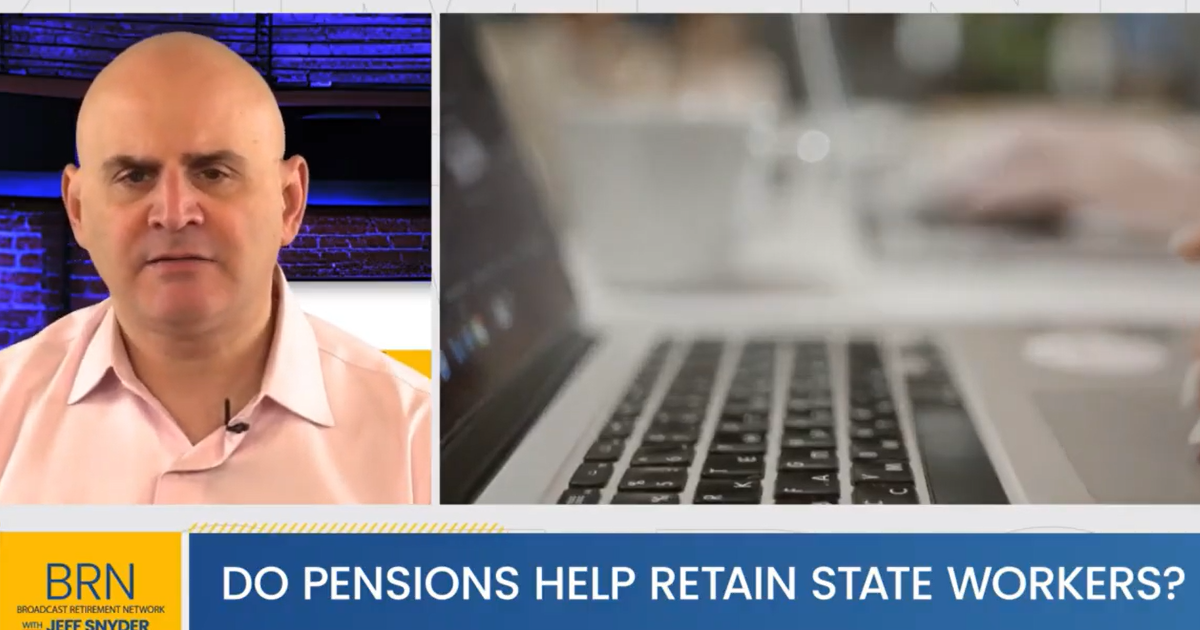Copyright The Street

Broadcast Retirement Network’s Jeffrey Snyder discusses the impact of pensions with Reason Foundation’s Melissa Trujillo. Jeffrey H. Snyder, Broadcast Retirement Network This morning on BRN, do pensions help retain state workers? Joining me now to discuss this is Mariana Trujillo. She’s a policy analyst with the Reason Foundation. Mariana, great to see you. Thanks for joining us on the program this morning. Melissa Trujillo, Reason Foundation Thank you for having me. Jeffrey H. Snyder, Broadcast Retirement Network Yeah, this is great work. And I think it’s, you know, there has been an evolution and transition for the last 40 years, just in general, in the private sector, away from pensions to the 401k. You did some research on Alaska, which, let me get you this to clarify, Alaska moved away from its pension to a 401k-type program. Is that correct? Melissa Trujillo, Reason Foundation That’s right, similar. It’s a defined contribution plan for public employees, which has some guardrails, but it’s a similar mechanism where you have your individual account and you have your contributions and your employer contributions and that gets invested in your, you know, you have the flexibility to carry that with you and do whatever you want with it. So it’s a 401k with guardrails, I would say. Jeffrey H. Snyder, Broadcast Retirement Network Yeah, similar, but all the investment risk tends to be on the individual as opposed to the state. And there’s a whole, that’s a whole separate show as to why they may consider going from a pension to a defined contribution-type plan. But I think you actually did some research on whether or not, you know, there’s always the concern when you move from pension to 401k that you’re gonna have difficulty retaining workers. That doesn’t seem to be the case in the research, at least the research that I read. Do you have any more detail on that? Melissa Trujillo, Reason Foundation Absolutely. So there’s a lot of research nationwide on, you know, the public sector specifically, which is what I deal with, and, you know, defined contribution, defined benefit plans and the impact on recruitment and retention. And most of it, almost all of it has pointed to employers not really being very responsive to what kind of retirement benefit you get, especially if you, you know, give, you know, a comparable defined contribution plan, you know, that doesn’t have any impact on, you know, recruitment and retention capabilities. And that was, you know, what I found in Alaska where it shifted to a defined contribution plan in 2006. And for the past few years, there has been a few calls, you know, legislators and activists wondering if perhaps, you know, it is time to return to the defined benefit plan that Alaska had before. The plan that led, you know, that was closed due to many fiscal challenges that it posed to the state because Alaska was allegedly, you know, facing a lot of trouble keeping and retaining its fellow employees. So I, you know, was able to gather some data and really evaluate this concern. And that doesn’t seem to be the case. Alaska’s turnover rate in 2022 was very much in line with many other states that offered defined contribution and defined benefit plans. Actually, it was significantly lower than the national average for state and local employees at 18% and the average in 2022 was about 20% turnover. In Texas, it was 23 and Utah, it was 28. In Kansas, it was 23 as well. And there are other states that have lower turnover rates, but in general, Alaska was actually on a lower end, which is very surprising, very surprising. I did not expect that at all because nationally, the state of Alaska had the labor market with highest turnover in the country. In 2022, the state of Alaska, public and private sector employers had a combined turnover rate of 78%. That’s the highest in the country. And part of it is, yes, because this economy of Alaska is cyclical, it’s, you know, driven by resource extraction and tourism, but another big part is that the state, you know, it’s logistically challenging to live in Alaska and it is, you know, the state is facing net out migration. So there are a lot of internal dynamics going on that make it a challenging labor market. So even with all of that in mind, to find that Alaska is actually on the lower end nationally for public employee turnover was very surprising and does not indicate any, you know, recruitment retention challenges, you know, from what we have seen. Jeffrey H. Snyder, Broadcast Retirement Network Yeah, I mean, it’s very surprising. I was looking at the numbers that you just stated because I have your report in front of me. So, I mean, that does surprise me. Do you think that maybe some of that is due to the fact that, you know, the world is, the expectations of people have changed? You know, many of us, myself included, have grown up only knowing a defined contribution plan and now people have many jobs. They don’t just stay, unfortunately, you know, in the past they stayed in government for a career. So do you think maybe some of this, some of the retention stats have something to do with just the changing expectations or beliefs in some of the, I’m just saying in general, not necessarily just Alaska, but across the country, people are just like, hey, this is a job I might have for five years and maybe a job I have for 10 years. But either way, my expectation is I’m going to move from job to job. Just wondering what your thoughts on that are. Melissa Trujillo, Reason Foundation Absolutely. And I think, you know, it isn’t just a cultural matter, but I think it’s one of the cultural things that are driven by economics. And, you know, it’s just the transaction costs necessary to find a new job are so much lower, right? Like I can apply an interview for a job on my phone. On my commute to a different job, I can apply, you know, for, you know, to work in a different state from Indeed, right, on my phone, on LinkedIn. I can interview without leaving my house, right? All like lowering the costs of searching and acquiring, you know, a new job or hiring people have led it to, you know, be a lot easier. And because it’s easier and cheaper, you’re going to do more of it, right? That’s basically economics. So people have been, you know, switching jobs more often and there’s a general expectation, you know, that you can. And because of the contribution plans have become so prevalent in the private sector, employees know that they can have an adequate retirement by, you know, funding their retirement, regardless of what employee, you know, employer they have. So there’s definitely, you know, that expectation. And I think, I also believe that just the general retirement conversation has, you know, become more data informed. I think before there was a big, you know, almost some survivor bias of trying to make retirement adequate to only those that stay long enough with you. And you might not realize that many people that, but most people that you hire won’t, you know, retire with you as an employer, right? You hire people, they say for four, five, six years, they leave, they go do a different job. And that has been true today, but also, you know, for a long time. But I believe, I actually think that for a long time we haven’t really been looking at the people that, you know, that come and leave a certain position and neglected their retirement security. And now that it has become, you know, different contributions are in a flexible and mobile plans that, you know, and they’re more normalized now. I think we have, you know, come to realize that the people that work for you for a few years matter as well. Not, and you should, you know, provide a, a part of their compensation can be, you know, retirement benefits and not just those that, you know, stay and with you for 30, 40 years, you know? Jeffrey H. Snyder, Broadcast Retirement Network Yeah, you know, just curious, you mentioned Indeed and some of the other services. Does the retirement benefits still, is that still a priority for workers? I mean, there’s so many other types of benefits, healthcare, long-term care. Many Americans now are caregivers to their loved ones. So is it, you know, and as you stated, retirement is so different today because we live longer. It’s now no longer 65 in a rocking chair with your grandkids. It’s now 75, 85. People can work longer. So does that retirement benefit, is that still a high priority among job seekers? Just anecdotally, you don’t have to give me the exact, I’m not expecting you to have the exact numbers, but I’m just saying anecdotally, is it still up there at the top in terms of expectations for new job seekers? Melissa Trujillo, Reason Foundation You know, if you look at entry and exit surveys, if you interview people, the second that they accept a job offer, and that’s an entry survey, like why do you want to work here? What attracted you to this position? And I’m saying specifically for public employees, which is what my research focuses on, retirement benefits are very low in those rankings. Whether you look at young employees or just the general pool of employees, like new people you hire, they say, why do you want to work here? They often say, well, I need a job, right? I need a salary. That’s why I want to work here. You know, that shows up in the survey. But also because, you know, many people join private sector because that shows up in the ranking. It’s very highly meaning, they want a job that is meaningful. They want job security, and that’s a big reason why people want to join the public sector as well. You know, they want good culture. They want benefits. And then somewhat among, you know, like after mentioning many other things, including the ability to work remotely, flexibility, vacation time, somewhere in there retirement benefits show up. So it’s really, survey results indicate it’s not a big priority. And the same is for exit surveys. If you interview people when they leave a job, and again, I’m referencing public sector surveys, and ask why are you leaving? Why are you not happy? Salary is, again, number one thing that shows up. And then other benefits I just mentioned, flexibility to work remotely, vacation time, just bad leadership. I don’t like my boss, or I don’t like the culture here. I wasn’t promoted enough. And then somewhere in there, after all these things, retirement benefits show up as another meaningful thing. So it’s not a priority. And you can see that just by going on LinkedIn and Indeed yourself. And you’ll see that when you read the job descriptions, you know, they often mention salary, or just some broad, you know, idea that, you know, we compensate people well. They mentioned benefits in general. And then they mentioned, you know, many things, culture. And often job postings don’t give you many details, if no detail at all about retirement benefits that company offers. And definitely not about does the needy greedy, right? Is it a defined benefit, defined contribution plan? What is the multiplier? All these details are not in job descriptions because really that’s not what people are looking for when they’re looking, you know, deciding if they want to apply to a position or not. It’s not a priority. Jeffrey H. Snyder, Broadcast Retirement Network Yeah, it’s going to be interesting. And it’s going to be interesting to watch Alaska. Will they revert, not revert? Will they bring back the DB, the pension plan? I guess we’re going to have to find out. Mariana, we’re going to have to leave it there. Great research. Thanks for joining us. And we look forward to having you back on the program again very soon. Melissa Trujillo, Reason Foundation Thank you so much. Jeffrey H. Snyder, Broadcast Retirement Network And don’t forget to subscribe to our daily newsletter, The Morning Post, for all the news in one place. Details, of course, at our website. And your subscription helps support all this great BRN content. And we’re back again tomorrow for another edition of BRN. Until then, I’m Jeff Snyder. Stay safe, keep on saving, and don’t forget, roll with the changes.



